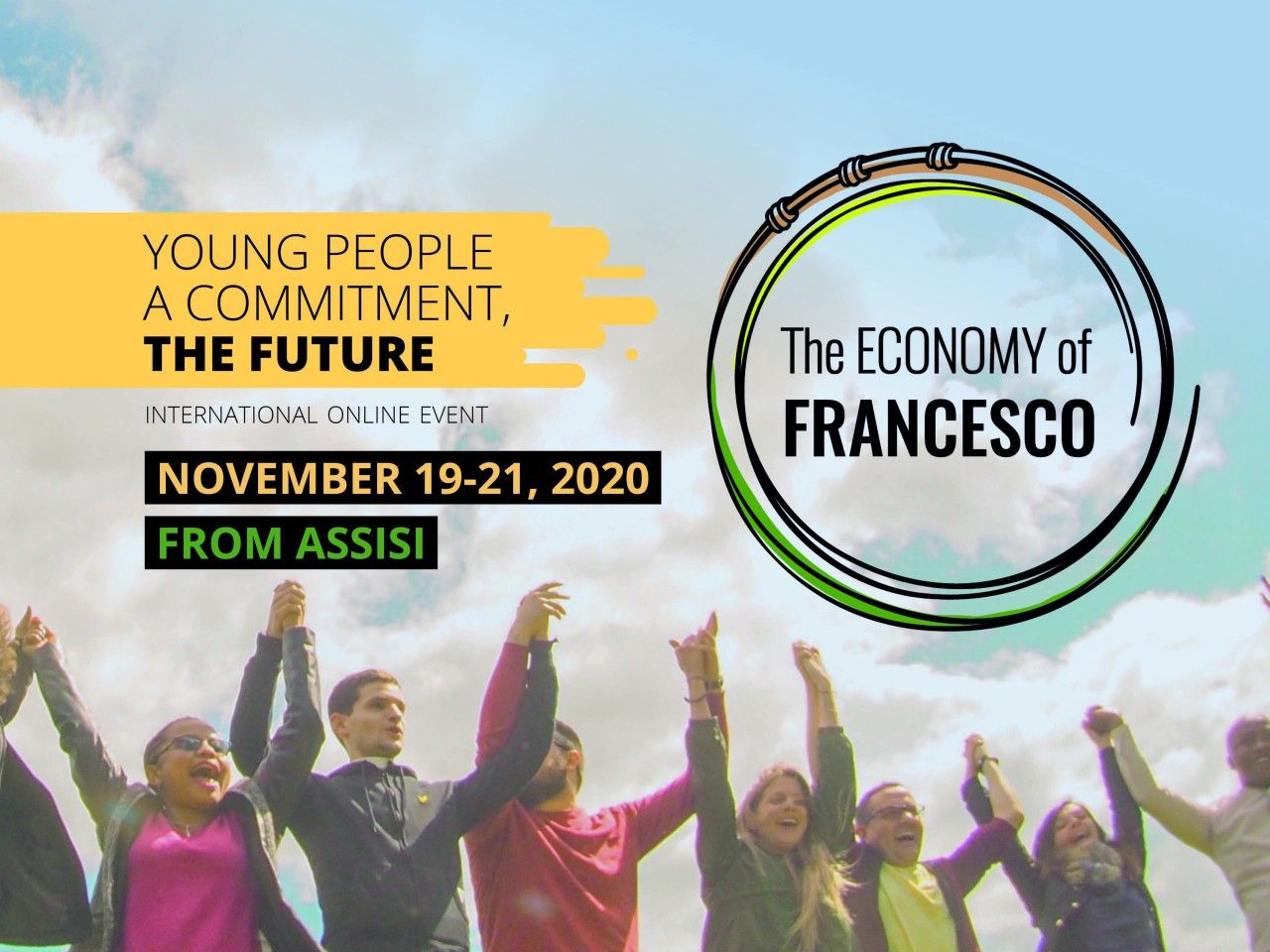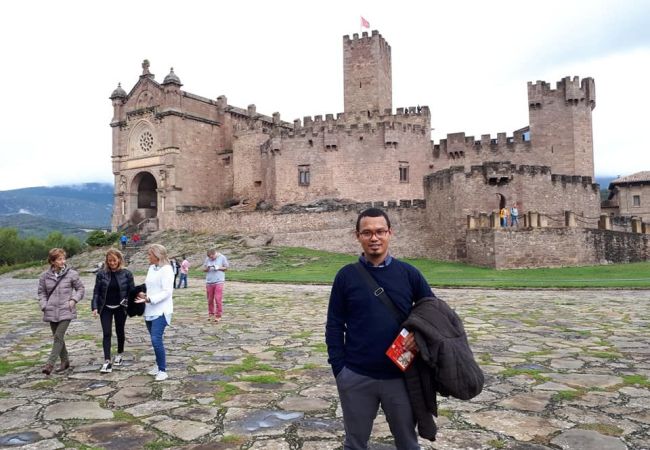I giovani, un patto, il futuro
Dal 19 al 21 novembre ad Assisi si è tenuto un evento internazionale di grande portata, da alcuni definito come la vera anti-Davos.
I comunicati stampa dell'incontro ci offrono alcune statistiche sui partecipanti. Per L' Economia di Francesco (EoF) sono arrivate più di 3300 candidature, con oltre 2000 partecipanti da 120 Paesi, provenienti principalmente da Italia, Brasile, USA, Argentina, Spagna, Portogallo, Francia, Messico, Germania e Regno Unito. Le Nazioni collegate in questi giorni erano più di 120.
I protagonisti dell'evento digitale sono stati 2000 under 35 provenienti da tutto il mondo, 56% uomini e 44 % donne. Erano economisti, imprenditori, studenti, changemakers e operatori del settore sociale mossi dall'obiettivo comune di costruire un mondo più equo e sostenibile.
I lavori erano suddivisi per villaggi tematici, che hanno sviluppato ciascuno una di queste 12 questioni: management e dono; finanza e umanità; lavoro e cura; agricoltura e giustizia; energia e povertà; business e pace; donne per l’economia; CO2 e disuguaglianza; profitto e vocazione; imprese in transizione; vita e stile di vita; politiche per la felicità.
L’EoF si è aperto ad Assisi il giovedì pomeriggio, con Listen to the cry of the poorest to transform the earth, un video curato dall' International Movement ATD Fourth World, seguito dal saluto del Prefetto del Dicastero per il Servizio dello Sviluppo Umano Integrale, il Cardinale Peter Turkson: «avete deciso di costruire una rete globale di giovani leader e portatori di cambiamento nel campo economico, una rete che può "dare un'anima all'economia del futuro". E in risposta alla pandemia, state cercando di aiutare Papa Francesco, la Chiesa e tutto il mondo a uscirne migliori, immaginando e sviluppando un'economia diversa, inclusiva e sostenibile, che possa aiutarci a comportarci come fratelli e sorelle che vivono in una casa comune».
Gli incontri online hanno visto la partecipazione di importanti relatori internazionali che hanno trattato temi di estrema rilevanza, come lo sviluppo sostenibile, la pace, la povertà e le crisi alimentari in tempo di pandemia e moltissimi altri.
Ha avuto un ruolo centrale, venerdì 20, il premio Nobel per la Pace 2006, Muhammad Yunus l’ideatore del microcredito, il quale ha tracciato la via per un cambio di paradigma: «La pandemia di Covid-19 ha rivelato tutte le debolezze del sistema attuale. Coloro che erano ai margini dell'esistenza a livello globale sono finiti ancora di più ai margini. Ora tutti lavorano per tornare alla situazione precedente alla pandemia. Ma perché vogliamo tornare a quel sistema, che era terribile? Il treno che ci stava portando verso la morte si è fermato. È il momento di scendere e chiederci: vogliamo tornare indietro o è il momento giusto per seguire la direzione opposta: un mondo senza inquinamento, senza concentrazione della ricchezza, senza disoccupazione massiccia».
Rilevante anche l’incontro con l’attivista ambientale e Membro del Forum Internazionale sulla Globalizzazione, Vandana Shiva che ha ribadito come l’economia dovrebbe prendersi cura della nostra casa comune: «Se lavoriamo in armonia con la natura, creiamo benessere. Le parole chiave devono essere: distribuzione locale, cibo sano, restituire alla Terra ciò che la Terra ci dà, condivisione. Ridiamo alla terra ciò che essa ci fornisce, avremo cibo migliore. Lo spirito è quello della gratitudine, del servizio, della cura».
L’evento si è concluso sabato 21 col videomessaggio del Santo Padre Francesco che ha sottolineato l’importanza di avviare processi, «tracciare percorsi, allargare orizzonti, creare appartenenze» per dar inizio ad un cambiamento che porti ad una diversa narrazione economica e approdare a nuovi paradigmi, seguendo i cammini della «mistica del bene comune» e della «cultura dell’incontro».
Letizia Fiorini, una partecipante del meeting ad Assisi, sintetizza l’evento in tre parole prese dall’intervento di Papa Francesco: «questo incontro virtuale ad Assisi… è la spinta iniziale di un processo che siamo invitati a vivere come vocazione, come cultura e come patto» e continua dicendo «queste sono le parole che silenziosamente ci hanno accompagnato fino ad adesso e che continueranno ad essere un riferimento. Infatti, alla domanda “per me l’EoF cosa sarà?” qualcuno ha riposto “un impegno per la vita”, ed io non ho trovato una definizione migliore».
Ecco i link a disposizione per accedere al materiale informativo e multimediale dell’EoF e al videomessaggio di Papa Francesco col testo tradotto in diverse lingue.
THE ECONOMY OF FRANCESCO
YOUNG PEOPLE, A COVENANT, THE FUTURE
An international major event, who someone called “the real anti-Davos”, was held in Assisi from 19 to 21 November.
The press releases of the meeting offer us some statistics about the participants. For The Economy of Francesco (EoF) arrived more than 3,300 requests, with over 2,000 participants from 120 countries, mainly from Italy, Brazil, USA, Argentina, Spain, Portugal, France, Mexico, Germany and the UK. The protagonists of the digital event were 2,000 people under the age of 35 from all over the world, 56% men and 44% women. They were economists, entrepreneurs, students, changemakers and social workers motivated by the common goal of building a more just, sustainable world.
The activities were divided into thematic villages. Each of them developed one of the following 12 issues: Work and Care; Management and Gift; Finance and Humanity; Agriculture and Justice; Energy and Poverty; Vocation and Profit; Policies and Happiness; CO2 and Inequalities; Business and Peace; Women for Economy; Businesses in transition; Life and Lifestyle.
The EoF opened in Assisi on Thursday afternoon, with Listen to the cry of the poorest to transform the earth, a video edited by International Movement ATD Fourth World, followed by the message of the Prefect of the Dicastery for Promoting Integral Human Development, Cardinal Peter Turkson: «You have decided to build a global network of young leaders and bearers of change in the economic field, a network that can "give a soul to the economy of the future"». And in response to the pandemic, you are trying to help Pope Francis, the Church and the whole world to come out better by imagining and developing a different, inclusive and sustainable economy that can help us to behave as brothers and sisters who live in a common house».
The online meetings saw the participation of important international speakers who dealt with extremely important topics, such as sustainable development, peace, poverty and food crises in times of pandemics and many others.
On Friday 20 November, the winner of the Nobel Prize for Peace 2006 and creator of microcredit, Muhammad Yunus, played a central role in charting the way for changing the paradigm: «The Covid-19 pandemic revealed all the weak points of the current system. Those who, on a global level, lived on the edge of existence have been even more marginalized. Now, everyone is working to return to the same situation before the pandemic. But why do we want to go back to that system, which was terrible? The train that was leading us to our death has stopped. It's time to get off and ask ourselves: do we want to go back or it's the right time to follow the opposite direction : a world without pollution, without wealth concentration, without massive unemployment?».
The meeting with Vandana Shiva, environmental activist and member of the International Forum on Globalization, was also relevant: «If we work in harmony with nature, we create well-being. The keywords must be: local distribution, healthy food, return to the Earth what the Earth gives us, sharing. By returning to the earth what it offers us, we'll have better food. The right spirit is that one of gratitude, service and care».
The event ended on Saturday 21 with the video message of his Holiness Pope Francis who stressed the importance of sparking processes, «tracing paths, broadening horizons and building common bonds». This allows us to initiate a change that will lead to a different economic narrative and reach new paradigms, following the paths of «a mystic of the common good» and of the « culture of encounter».
Letizia Fiorini, one of the participants, summarizes the event in three words taken from the intervention of Pope Francis: «this virtual meeting in Assisi… is rather the beginning of a process that we are asked to undertake together as a vocation, a culture and a covenant». She continues saying «these are the words that have silently accompanied us until now and which will continue to be a reference. In fact, to the question “what will the EoF be for me?” someone answered “a commitment for life”, and I haven't found a better definition».
Here are the links available to access the EoF information and multimedia material and to the video message of Pope Francis with the text translated into different languages.
Link &
Download
Access here with your username and password to view and download the reserved files.





